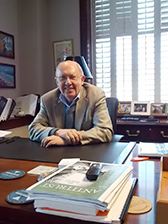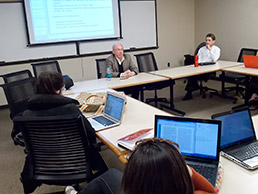Originally published in Indiana Lawyer, by Marilyn Odendahl – April 9, 2014
Ironically, the eight years that veteran attorney Donald Knebel spent avoiding intellectual property law gave him the experience he needed when he finally turned his attention to patent litigation.
Knebel started practicing law in the mid-1970s, just about the time that infringement disputes were beginning to shift from bench trials to jury trials. Most patent lawyers were engineers who preferred to present their cases to a judge because the jury process came with too many uncertainties.
However, Knebel was the opposite. He joined Barnes Hickam Pantzer & Boyd right out of Harvard Law School and told his new employers he had no interest in patent law. His studies at Purdue University and short career as an electrical engineer left him with the impression that the profession was technical and routine.

Colleagues say Donald Knebel, of counsel at Barnes & Thornburg, always seems to genuinely enjoy his work. (IL Photo/ Marilyn Odendahl)
Knebel practiced first in antitrust litigation where he encountered juries. When a 1982 merger converted the firm to Barnes & Thornburg LLP, the Star City native switched to doing intellectual property and antitrust work.
He brought his skills as a litigator to patent law and crafted his practice around explaining in everyday terms the item at the center of the litigation, whether it was the intricate workings of a technical device or a theory that the average high-school educated person sitting on a jury would likely not comprehend. Knebel, who devoted time to studying juries and the techniques of other lawyers, used simple themes in his trials, made sure he had heroes and villains, and incorporated colors and sounds as well as exhibits to sway the laypeople in the jury box.
“He’s the master of the facts in any case that he tries,” said Mark Janis, director of the Center for Intellectual Property Research at Indiana University Maurer School of Law and Knebel’s former Barnes & Thornburg colleague.
Retiring at the end of 2013, Knebel built a 30-plus year career in patent litigation that included handling cases in 23 states and conducting trials to verdict in 10 states. His work earned him the honor of being named Best Lawyers in America’s Indianapolis Intellectual Property Litigation Lawyer of the Year for three straight years starting in 2011.
He has litigated cases involving fuel caps on automobiles, glucose monitors, newspapers, pharmaceuticals, pesticides and sand and gravel mining. For a dispute over recombinant DNA, he started by reading about DNA in a book from the “for Dummies” series and eventually was able to depose Harvard- and Stanford-educated researchers using their own medical terminology.
Yellow and blue make green
“The (cases) I remember are the ones where I thought that a win was unlikely,” Knebel said. “For me, the most fun cases were those where people, going in, thought you shouldn’t win the case and then we did win the case.”
One such case was tried in 1992 in Alexandria, Va. The patent infringement suit involved admittance responsive networks and the complex mathematical concept of imaginary numbers. It was filed without warning in a District Court nicknamed the “rocket docket” because of how quickly the judicial process moved there.
Janis was a young attorney with an office down the hall from Knebel. Typically patent litigation cases are settled before trial, but for a short period the Barnes & Thornburg team had a string of IP disputes that went to a jury and Janis often got pulled in to help.
“It was just a blast,” the IU Maurer professor remembered.
Knebel was the lead defense attorney on the Alexandria case. Most patent cases take years, but here the team had to scramble to get prepared for trial in only eight months. The biggest hurdle was finding a way to explain to a jury the abstract notion of imaginary numbers, a concept that electrical engineers can have difficulty grasping.
Knebel took the first step over the hurdle by giving the defense’s expert witness from Purdue University, Leroy Silva, one simple instruction.

Donald Knebel shares many stories from his 39-year career with his students at Indiana University Maurer School of Law. He started teaching in 2011 at the invitation of his former colleague, Mark Janis (far right), director of the Center for Intellectual Property Research at IU Maurer. (IL Photo/ Marilyn Odendahl)
“I said, ‘Dr. Silva, if I hear the term “imaginary number” once in the course of this case, I’m going to go get another expert.’”
The confusing term was banished, but the defense still had to explain the concept. Knebel believes he hit upon the answer by looking at a Ziploc bag where the yellow strip and blue strip across the top turn green when they come together to form a seal.
The Barnes & Thornburg attorneys then framed their argument around color, describing the plaintiff’s product as green. While the defendant had the yellow, they asserted he did not have the blue so he could not have infringed because he could not create the green.
Conversely, the plaintiff’s attorneys referred to imaginary numbers and had an exhibit of a circuit with part surrounded by a red box which, Janis said, would only have made sense to an electrical engineer.
The jury returned a verdict for the defense. Opposing counsel filed an unsuccessful appeal, arguing the yellow-and-blue-makes-green exhibit was so effective, it threw the jury off and the court should declare a mistrial.
Knebel considered the appeal a compliment.
“It was a poster,” Knebel said, describing the exhibit. “Just a poster. Wish I still had it, it’s one of the classics of my career.”
Back to school
Since 2011, Knebel has been passing along his knowledge and experience gained from cases like the one in Alexandria to students at IU Maurer School of Law. He is an adjunct professor and senior advisor at Janis’ center, teaching antitrust classes and intellectual property classes.
On a chilly Monday afternoon, a handful of upper-level students in Knebel’s patent trial practice class listened to their teacher give tips and ideas for presenting intellectual patent cases to juries. The students are spending the semester preparing for, and will eventually try in a moot court setting at Purdue, a hypothetical case based on a patent dispute Knebel litigated twice.
“I try to teach them what it takes to be a successful trial lawyer, which is not necessarily what people think it takes,” Knebel said. “I try to accumulate the experience I’ve had for the last 39 years, much of that in intellectual property trial work … and put that experience, as much as I can, into the minds and hands of these students.”
Students said the class is synthesizing what they have learned in other law school classes and emphasizing to them, most significantly, that decisions in trials have consequences. They have come to realize that positions they took early in the preparation process could create obstacles as the trial date comes closer.
During the class, Ian Clouse, a third-year student with an engineering background, took many notes, highlighting ideas from Knebel’s presentation that he could use in his jury arguments. Practitioners like Knebel, Clouse said, are good in the classroom because they point out the practical aspects of lawyering by showing how the attorneys used or didn’t use their skills, where academics can get mired in the technical and theoretical.
Law students from Taiwan’s National Chiao Tung University in Teipei are posing as the clients in the case that Knebel’s Bloomington students are preparing. Knebel presented his lecture on juries to the overseas bunch via video conferencing technology and got a vastly different reaction than from the IU Maurer students. The Taiwanese students had problems believing that U.S. attorneys present complex patent cases to juries and let those juries decide the outcome.
Juries have changed intellectual property practice from less patent-like to more litigation-like, Knebel said, but whether jury trials are better than bench trials is an unanswered question.
“If the judge is against you, it just takes one judge to be against you where if you’re doing a jury trial,” he said, “one person can’t control the jury so you have more chances to win.”•